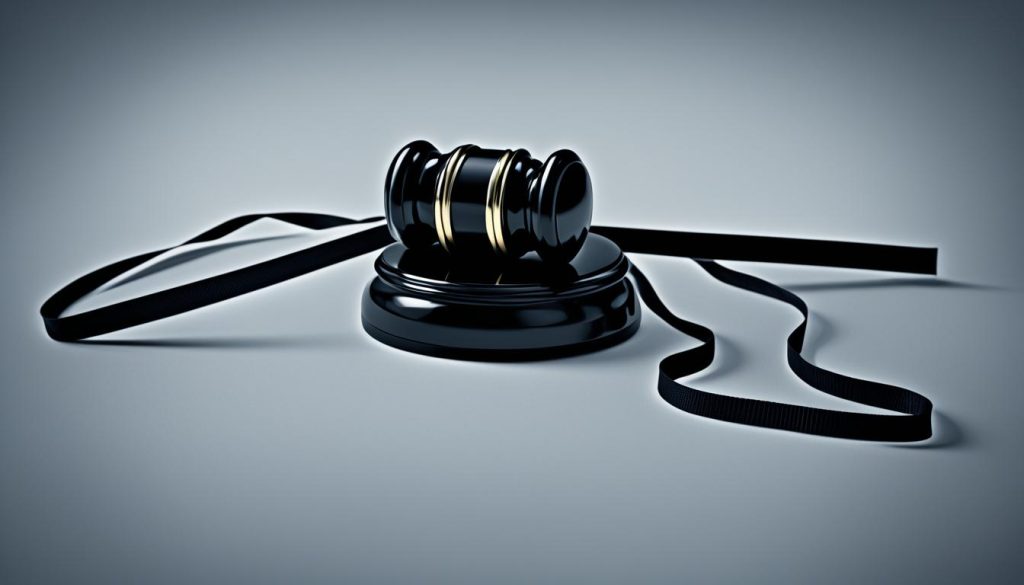When a loved one dies suddenly because of someone else’s mistake, families might have the right to seek justice. It’s a tough process, but knowing what to expect can help. This can guide you through the tough times1.
In Florida, there are clear rules for wrongful death claims1. Families can file a lawsuit through the estate of the person who died. This includes the spouse, kids, parents, and others who depended on them financially2.
To win a wrongful death case, you must prove the defendant’s actions caused the death. You also need to show how the loss has hurt the family financially and emotionally2. Damages can include funeral costs, medical bills, lost wages, and the pain of losing someone important1.
Remember, there’s a deadline to file a wrongful death lawsuit, usually two to three years after the death3. The amount you can claim also depends on things like the person’s age, income, and how they were related to you3.
Handling wrongful death cases is complex. It’s wise to get help from a skilled lawyer. They can handle the legal stuff, collect evidence, and fight for your rights12.
Key Takeaways
- Wrongful death claims in Florida must be filed within two years of the death, with some exceptions.
- Eligible surviving family members include the deceased’s spouse, children, parents, and financially dependent relatives.
- Damages in a wrongful death claim can cover funeral expenses, medical bills, lost wages, emotional suffering, and more.
- The value of a wrongful death claim is determined by factors like the deceased’s age, income, and relationship with the plaintiff.
- Seeking guidance from an experienced wrongful death attorney is highly recommended to navigate the legal complexities.
What Is Wrongful Death?
Wrongful death is when someone dies because of another person’s mistake or bad actions4. The family or estate of the deceased files a lawsuit to get compensation for their loss4.
Defining Wrongful Death
Wrongful death happens when a person dies from someone else’s carelessness or on purpose4. What counts as wrongful death changes by state, but it’s usually a death caused by someone else’s actions5.
Key Elements of a Wrongful Death Claim
To win a wrongful death case, the claim must prove three things:4
- The defendant was careless or did it on purpose.
- The defendant’s actions led directly to the victim’s death.
- The family or estate has lost something valuable because of the death.
Wrongful death cases are different from criminal charges. They aim to get money damages, not criminal punishment4.
| Wrongful Death Claim Elements | Description |
|---|---|
| Negligence or Intentional Act | The defendant’s actions were careless or done on purpose, causing the victim’s death. |
| Direct Causation | The defendant’s actions directly led to the victim’s death. |
| Measurable Damages | The family or estate has lost something they can measure because of the victim’s death. |
Wrongful death claims can come from many things like intentional harm, medical mistakes, or car accidents4. Laws and compensation for these cases differ by state and situation5.
“A wrongful death lawsuit can be pursued if a loved one dies as a result of another individual’s legal fault.”4
Differences Between Wrongful Death and Personal Injury Lawsuits
Wrongful death claims and personal injury lawsuits have some similarities but also key differences6. In a personal injury case, the victim who survived can get money for their own losses like medical bills and lost wages7. In a wrongful death lawsuit, the family or estate of the deceased seeks compensation for their losses, including funeral costs and lost future earnings7.
Compensation for Losses
The damages in wrongful death and personal injury cases are quite different7. In personal injury claims, damages include medical bills and lost wages, among others7. Wrongful death claims focus on funeral costs and the emotional loss of a loved one7.
Parties Involved in the Lawsuit
Who brings the lawsuit is another big difference7. Personal injury claims are filed by the victim, while wrongful death claims are brought by the survivors or estate76. In Florida, certain family members can claim damages in a wrongful death case6.
The legal standards and damages in wrongful death and personal injury cases also differ7. Both types need proof of negligence, but the specifics and filing timelines vary7.

To sum up, wrongful death and personal injury lawsuits come from similar situations but have many differences7. It’s important to know these differences when seeking compensation for losses from a tragic event678.
wrongful death claims, legal process, compensation, wrongful death lawsuit
Understanding the legal steps for a wrongful death claim can be tough. But knowing the main steps can help you during this hard time9. First, you must file the lawsuit within the given time limit, usually two years after the victim’s death in North Carolina9. Then, your legal team must prove the defendant was negligent or acted on purpose, causing the death. They also need to show how the death has affected the surviving family10.
Wrongful death cases can come from many things like car accidents, work accidents, or faulty products10. The plaintiff must prove the defendant didn’t meet their duty of care, leading to the death10. Even though the proof needed is less strict than in criminal cases, proving your case can still be hard10.
If you win, you could get money for medical bills, funeral costs, lost wages, and for the loss of the loved one’s support9. But, North Carolina’s law can make it hard if the victim was partly to blame9. You might also get extra damages if the death was intentional or reckless9.
Many wrongful death cases settle before going to court10. But it’s important to act fast and get a skilled lawyer to protect your rights and get fair compensation10.
In North Carolina, the estate of the deceased starts the wrongful death lawsuit, not family members11. If there’s compensation, it’s given out based on state laws. Usually, the spouse and kids get most of it11.
Dealing with a wrongful death claim can be overwhelming. But knowing the process and getting advice from a good lawyer can help you get a fair outcome for your family91011.
Who Can File a Wrongful Death Lawsuit?
When a tragedy happens and someone you love dies because of someone else’s fault, you might be able to file a wrongful death lawsuit. But who can do this? It depends on your state’s laws. Usually, the right to file a lawsuit goes to the family of the person who died or their estate’s representative.
In many places, the spouse, kids, and parents of the deceased can file a wrongful death lawsuit12. In Massachusetts, the spouse gets first chance to claim, then the kids, parents, and siblings12. Some states also let domestic partners, people who depended on the deceased financially, and those who thought they were married to the deceased file a lawsuit13.
If the deceased made a will, the court picks a personal representative or executor to file the lawsuit for the family13. If there was no will, the state’s laws decide who can represent the estate and sue12.
Remember, who can file a wrongful death lawsuit and when can change a lot by state13. Some states give you as little as one year or up to 10 years to file after the death14. It’s key to talk to a wrongful death lawyer to know your rights and meet legal needs.
A wrongful death lawsuit aims to get money for the losses the family faces because of the death13. This can cover medical bills, funeral costs, lost income, and more14. Sometimes, it can also lead to punitive damages to punish the guilty party and stop similar actions13.

If you’ve lost someone close to you due to someone else’s fault, it’s important to know your rights and legal options. With the help of a skilled wrongful death lawyer, you can go through the legal steps and fight for justice and compensation your family needs121314.
Types of Wrongful Death Cases
Wrongful death cases can come from many different situations, each with its own legal rules. It’s important to know the main types to understand the legal process. We’ll look at intentional acts, negligence, and malpractice.
Intentional Acts
Intentional deaths happen from criminal actions like assault, battery, or murder. In these cases, the plaintiff must prove the defendant’s actions led directly to the victim’s death. This includes things like homicide, drunk driving, or violent crimes15.
Negligence
Negligence can lead to wrongful deaths in many ways, like car crashes, faulty products, slips, animal attacks, and more16. The plaintiff must show the defendant was careless and this carelessness caused the death. They also need to prove the family has suffered harm.
Malpractice
Malpractice deaths happen when a doctor or nurse doesn’t provide proper care, leading to a patient’s death17. The plaintiff must prove the healthcare worker didn’t meet the standard of care. This mistake was the main reason for the patient’s death.
In all wrongful death cases, the plaintiff must show the defendant’s actions caused the death. They also need to prove the family has suffered losses.

“Wrongful death cases can be complex and emotionally challenging, but understanding the different types can help guide families through the legal process.”
Knowing the differences between intentional acts, negligence, and malpractice helps people and their lawyers deal with these cases. They can then seek the right compensation for their losses151617.
Proving Liability in a Wrongful Death Case
To win a wrongful death lawsuit, the plaintiff must prove the defendant was liable. This means showing the defendant had a duty of care, broke that duty, caused the death, and the family suffered damages18. This can be due to negligence, intentional actions, or medical mistakes.
The first step is to show the defendant had a legal duty to the deceased. This could be from owning property, being a professional, or following traffic laws18. Then, the plaintiff must prove the defendant didn’t meet this duty through what they did or didn’t do18.
Next, the plaintiff must link the defendant’s actions to the victim’s death18. This means showing a direct cause-and-effect relationship. Evidence like witness statements and expert opinions can help prove this.
Finally, the plaintiff must show the family has suffered losses because of the death18. These losses can include funeral costs, lost income, and emotional pain. It’s important to have detailed records of these losses.
It’s also key to overcome any defenses the defendant might use18. The defendant might argue the plaintiff didn’t meet all the needed points or that the death was unexpected or the victim’s fault. A good lawyer is crucial to fight these arguments.
| Duty of Care | Breach of Duty | Causation | Damages |
|---|---|---|---|
| The defendant owed the deceased a legal obligation to act reasonably and avoid causing harm. | The defendant failed to uphold this duty through their actions or inactions. | The defendant’s breach of duty directly caused the victim’s death. | The surviving family members have suffered measurable losses, such as funeral expenses and lost income. |
Winning a wrongful death case needs a deep knowledge of the law and careful evidence presentation181920. With help from an experienced lawyer, plaintiffs can tackle the legal challenges and get the justice and compensation they deserve.

Damages and Compensation in Wrongful Death Cases
When a loved one dies because of someone else’s mistake, the family can file a wrongful death lawsuit21. They can claim damages and compensation. This helps support the family and bring justice for their loss.
One key claim is for lost future earnings. This is the income the deceased would have made for their family21. Families also get money for funeral and burial costs, which can be $2,000 to $10,000 in the U.S21.. They can also claim medical bills before death and pain and suffering.
Loss of companionship, guidance, and support is another big claim22. These non-economic damages try to measure the emotional pain and loss after a loved one dies too soon.
The damages and how much they’re worth depend on the state’s laws23. Some states limit non-economic damages, while others don’t22. Getting a fair settlement or verdict needs detailed proof of the family’s financial and emotional losses.
The main aim of a wrongful death lawsuit is to help the family move on and find closure21. Money can’t bring back a loved one, but it can ease the financial and emotional pain of their loss.
Choosing the right lawyer for a wrongful death case is crucial22. Look for someone with a good track record, strong communication, compassion, and the right resources. With the right lawyer, families can go through the legal process and get the justice and support they deserve.
Conclusion
Losing someone close to us because of someone else’s mistake is very hard. But, the legal system lets us seek justice and money through wrongful death lawsuits24. Knowing what these claims are about, how they differ from personal injury cases, and what damages you can claim helps you make good choices25. The legal process is complex, but a skilled lawyer can protect your rights and help you get the compensation you deserve26.
Wrongful death claims help families get money for losses caused by someone’s mistake. This includes medical bills and lost wages24. The amount you can get varies, depending on how much the person who died earned and the losses the family faced24. Usually, close family members or those named in a will can file these lawsuits, with rules changing by state24.
In Missouri, wrongful death claims can lead to settlements over $1 million, based on the case details26. Settlements usually fall between $500,000 and over $1 million, with the money split among family members as the law says26. Family members like spouses, kids, parents, and those named in the will can file claims24. Understanding the legal steps and getting the right compensation can bring some justice and financial support after a wrongful death.
FAQ
What is wrongful death?
Wrongful death happens when someone dies because of another person’s actions. This can be intentional or due to negligence. The family or estate of the deceased can then file a lawsuit to get compensation for their loss.
What are the key elements of a wrongful death claim?
To win a wrongful death claim, you must prove three things. First, the defendant acted wrongly or on purpose. Second, their actions led directly to the victim’s death. Third, the family or estate has suffered losses because of this.
How are wrongful death claims different from personal injury lawsuits?
In personal injury cases, the injured person can claim damages for their own losses. This includes medical bills, lost wages, and pain. Wrongful death claims are for the family’s losses after someone dies. They cover things like lost future earnings, funeral costs, and the loss of a loved one.
What is the legal process for a wrongful death claim?
Handling a wrongful death claim is complex. It involves strict time limits, negotiations, and possibly a trial. These cases are civil, not criminal.
Who can file a wrongful death lawsuit?
Certain family members or the deceased’s estate can file a wrongful death lawsuit. Who can file varies by state. Usually, it includes the spouse, children, parents, and other close relatives.
What types of wrongful death cases can arise?
Wrongful death can happen in many ways. This includes intentional acts, negligence, and medical mistakes. Intentional cases might be crimes like assault or murder. Negligence cases come from car accidents, product flaws, or other careless actions. Medical malpractice cases happen when doctors don’t provide proper care, leading to death.
How is liability proven in a wrongful death case?
To win a wrongful death case, you must prove four things. First, the defendant had a duty to the deceased. Second, they didn’t meet that duty. Third, their failure caused the death. Fourth, the family has suffered losses because of this.
What types of damages can be awarded in a wrongful death case?
If a wrongful death lawsuit is successful, the court can award damages. These can include lost earnings, funeral costs, medical bills before death, pain, and suffering. The court can also award for the loss of companionship and support.
Source Links
- Florida Wrongful Death Claims: Who is Eligible for Compensation?
- How Does Florida Define Wrongful Death?: The 5 Star Law Firm
- Wrongful Death Lawsuits and Settlements: An Overview
- Wrongful Death Lawsuit | Free Case Evaluation | Ben Crump Law
- How Does a Wrongful Death Claim Work? | Ben Crump Law, PLLC
- Is Wrongful Death a Personal Injury? | Wrongful Death | Ben Crump
- How Wrongful Death Claims Differ from Personal Injury Claims
- Difference Between Personal Injury And Wrongful Death Claims
- Raleigh Wrongful Death Lawyers | Hardison & Cochran
- Wrongful Death Lawsuit Guide 2024
- Distribution of Wrongful Death Proceeds
- What Family Members Can Sue for Wrongful Death in Massachusetts?
- Who Has the Right to File a Wrongful Death Lawsuit?
- How Do I Pursue a Wrongful Death Lawsuit? | JJS Justice
- What is the difference between a survival action and a wrongful death case?
- 14 Most Common Types of Wrongful Death Cases
- Most Common Types of Wrongful Death
- Proving Liability in Wrongful Death Cases | Minton Law Firm
- How Hard Is It to Prove Wrongful Death?
- How to Prove Fault in a Wrongful Death Claim
- Wrongful Death Lawyers | Free Case Evaluation | Ben Crump Law
- How Damages Are Calculated in a Wrongful Death Case
- Who Gets Compensation in a Wrongful Death Lawsuit?
- Wrongful Death Claims Process: What to Expect During Litigation
- Factors that Can Affect a Wrongful Death Claim’s Value | Baratta Law LLC
- NGK Law Firm

